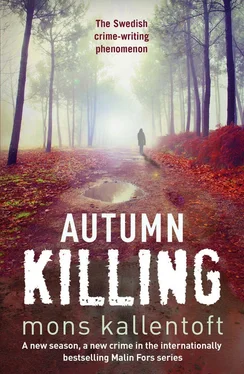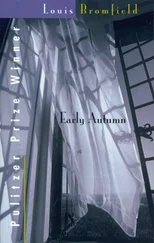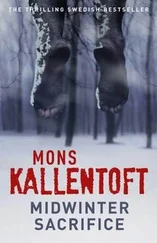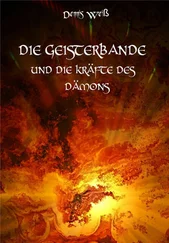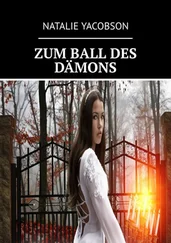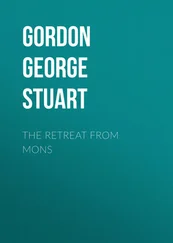Mons Kallentoft - Autumn Killing
Здесь есть возможность читать онлайн «Mons Kallentoft - Autumn Killing» весь текст электронной книги совершенно бесплатно (целиком полную версию без сокращений). В некоторых случаях можно слушать аудио, скачать через торрент в формате fb2 и присутствует краткое содержание. Жанр: Триллер, на русском языке. Описание произведения, (предисловие) а так же отзывы посетителей доступны на портале библиотеки ЛибКат.
- Название:Autumn Killing
- Автор:
- Жанр:
- Год:неизвестен
- ISBN:нет данных
- Рейтинг книги:3 / 5. Голосов: 1
-
Избранное:Добавить в избранное
- Отзывы:
-
Ваша оценка:
- 60
- 1
- 2
- 3
- 4
- 5
Autumn Killing: краткое содержание, описание и аннотация
Предлагаем к чтению аннотацию, описание, краткое содержание или предисловие (зависит от того, что написал сам автор книги «Autumn Killing»). Если вы не нашли необходимую информацию о книге — напишите в комментариях, мы постараемся отыскать её.
Autumn Killing — читать онлайн бесплатно полную книгу (весь текст) целиком
Ниже представлен текст книги, разбитый по страницам. Система сохранения места последней прочитанной страницы, позволяет с удобством читать онлайн бесплатно книгу «Autumn Killing», без необходимости каждый раз заново искать на чём Вы остановились. Поставьте закладку, и сможете в любой момент перейти на страницу, на которой закончили чтение.
Интервал:
Закладка:
The trees in the Horticultural Society Park, their crowns blown this way and that by the wind. Only gentle rain now. Not the sort of downpour that drives the rats out of the sewers. That’s happened several times this autumn. And the city’s pampered middle classes have been horrified by the beasts nurtured in subterranean Linkoping. As if they refuse to accept that there are rats living beneath their well-shod feet. Rats with hairless tails and razor-sharp teeth, rats that will still be there long after they themselves are gone.
It’s been a long time since he slept through the night. He has to get up at least three times to go to the toilet, and even then he has to stand there for five minutes before releasing the little trickle that made him so incredibly desperate to go.
But he doesn’t complain. There are people with far worse ailments than him.
He misses Bettina when he wakes up at night. Only an empty white bed where she was always contours, warmth and breath. As luck would have it, she went before the catastrophe, before Skogsa slid out of his grasp.
The castle was at its most beautiful on mornings like this.
He can see the castle within him, as though he were standing in front of it, at the edge of the forest.
The seventeenth-century grey stone walls seem to rise up from the fog, more potent than nature itself.
Skogsa Castle. Constructed and altered over the years according to the eccentric whims of his ancestors.
The copper roof seems to glow even when the sky is covered by low cloud, and the countless eyes of the building, the old castle’s loopholes and the more recent lead windows. He has always imagined that the loopholes were watching him from a distant moment in history, measuring him against his predecessors as master of the castle. The new windows are blind by comparison, as if looking for something lost.
From this viewpoint in his memory he can’t see the chapel, but it’s there. Bettina isn’t there, however — she had wanted him to spread her ashes in the forest at the north of the estate.
He can hear them.
The fish splashing uneasily in the black water of the moat, maybe the dead Russian soldiers, the hungry, walled-in spirits, are nipping at their gills.
Count Erik Fagelsjo.
A robber baron during the Thirty Years War. A favourite of Gustav II Adolf, the most brutal warrior of all, said to have mutilated twenty men in one day during the skirmishes following the Battle of Lutzen. Count Axel Fagelsjo thinks: I have always felt that man’s blood flowing through my veins.
In his youth he wanted to serve with the UN. But his father said no. His father, the friend of Germany, the colonel who had gone around Prussia in the thirties fawning over the blackshirts, the castle-owner who believed in a German victory long into the early 1940s.
And now?
After what had happened.
Count Erik Fagelsjo must be spinning with shame in the family vault in the chapel at Skogsa, lying there naked and shrieking with utter fury.
But there’s still a chance, if it weren’t for that useless dandy, that bastard who came slithering down from Stockholm like a legless lizard.
Axel Fagelsjo looks out across the park again. Sometimes this autumn he has imagined he can see a man under the trees, a man who seemed to be peering up at his windows.
Sometimes he’s thought it was Bettina.
He talks to her every day, has done since she died three years ago. Sometimes he goes out to the forest where he scattered her ashes, hiking there no matter what time of year, most recently through mouldering fiery yellow leaves and swaying mushrooms, his dark voice like an echo between the trees, trees that seemed almost rootless, floating.
Bettina.
Are you there? I never thought you’d go first. I miss you, you know. I don’t think anyone knows, not even the children, how much I love you, loved you.
And you answer. I can hear you telling me that I must be strong, not show what I feel, you see what happens if you give in. Axel, the wind whispers, and the wind is your voice, your breath against my neck.
Bettina.
My Danish beauty. Refined and unrefined at the same time. I first saw you in the summer of 1958, when I was working as a foreman at the Madsborg estate on Jutland, there to get some experience of farming.
You were working in the kitchen that summer. A perfectly ordinary girl, and we would swim in the lake together. I’ve forgotten the name of the lake, but it was on the estate, and I brought you back home after that summer and I remember Father and Mother, how they were dubious at first, but gradually gave in to your charm, and Skogsa succumbed to your cheerful temperament.
And you, how could you, Bettina? How dare you give in to cancer? Were you sad that our income wasn’t enough to keep the castle in good condition? It would have eaten too much into our capital, all the millions that were needed.
I don’t want to believe that. But I can feel guilty, the guilt you feel when you hurt the person you love most of all.
Pain. You had to learn all about pain, and you told me there was nothing worth knowing in those lessons.
The paintings on the walls here are your choices. Ancher, Kirkeby. And the portrait of my ancestor, Erik, and all the other wonderful fools and madmen who went before me.
You died at the castle, Bettina. You would have hated having to leave it, and I’m ashamed for your spirit now. No matter how gentle you could be, you could be just as hard when it came to defending what was yours.
Most of all you worried about the boy.
Among your last words: ‘Look after Fredrik. Protect him. He can’t manage on his own.’
Sometimes I wonder if he was listening at the door of your sickroom.
You never know with him. Or maybe don’t want to know. Like everyone else, I love my daughter, and him, my son. But I’ve always been able to see his shortcomings, even if I didn’t want to. I’d rather have ignored them and seen his good qualities instead, but that doesn’t seem to be possible. I see my son, and I see almost nothing but his failings, and I hate myself for it. Sometimes he can’t even seem to control his drinking.
The clock on the bureau strikes six and Axel stops by the sitting-room window. Something breaks out of the darkness below and someone walks through the park. A person dressed in black. The same man he thought he saw earlier?
Axel pushes the thought aside.
I knew it was a mistake, he thinks instead. But I still had to do it: letting Fredrik, my firstborn, the next Count Fagelsjo, look after our affairs, giving him access to our capital when my soul turned black after the cancer won. He never wanted to be at the castle, never wanted to manage the small estate and forest that were left, because it was now more profitable to take the EU subsidies for set-aside land than rent it out.
Didn’t want to. Couldn’t. But he ought to have been able to handle the money.
He’s got financial qualifications, and I practically gave him free rein.
But everyone has their good and bad sides, their faults and shortcomings, he thinks.
Not everyone has enough of the predator in them, enough of the merciless power that seems to be needed in this world. Father tried to get me to appreciate the responsibility that comes with privilege, how we have to assume a position of leadership in society. But in some ways he belonged to a bygone age. Certainly, I led the work out at Skogsa, I was respected in the finer society of the region, but a leader? No. I tried to get Fredrik and Katarina at least to appreciate the value of privilege, not to take it for granted. I don’t know that I succeeded.
Bettina, can you tell me what I can do to make Katarina happy? And don’t try that same old tune again. We had different opinions about that, as you know.
Читать дальшеИнтервал:
Закладка:
Похожие книги на «Autumn Killing»
Представляем Вашему вниманию похожие книги на «Autumn Killing» списком для выбора. Мы отобрали схожую по названию и смыслу литературу в надежде предоставить читателям больше вариантов отыскать новые, интересные, ещё непрочитанные произведения.
Обсуждение, отзывы о книге «Autumn Killing» и просто собственные мнения читателей. Оставьте ваши комментарии, напишите, что Вы думаете о произведении, его смысле или главных героях. Укажите что конкретно понравилось, а что нет, и почему Вы так считаете.
